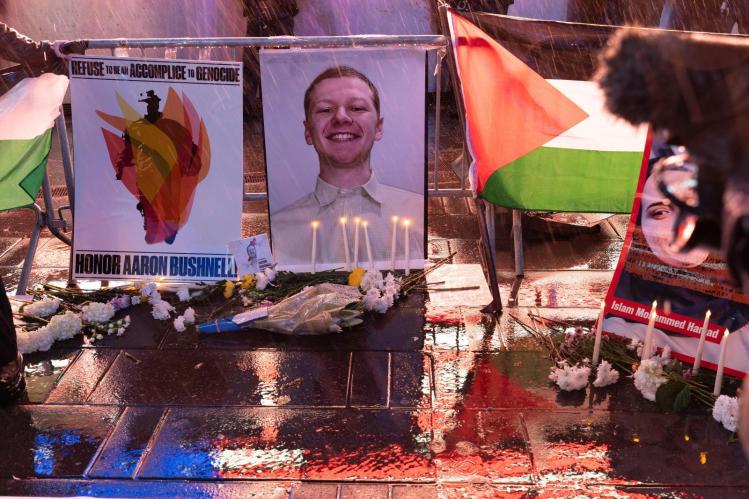
Self-immolation as a form of political protest has a long tradition. Among the most famous examples is that of twenty-year-old Jan Palach, who, in 1969, set himself on fire to protest the Soviet occupation of Czechoslovakia. Palach was part of an activist group that had chosen, at random, one of its members for this ultimate gesture. Despite the Catholic prohibition of suicide, Tomáš Halík, who later became a priest and famous theologian, helped organize a requiem for Palach. He and other Czech dissidents revere Palach to this day, claiming that his death planted a seed for the Velvet Revolution twenty years later.
The tradition continues. In February, a twenty-five-year-old Air Force officer named Aaron Bushnell died after setting himself on fire in front of the Israeli embassy in Washington D.C. His motive was clear: “I will no longer be complicit in genocide [in Gaza],” he said on Twitch, a live-streaming service, before dousing himself in flammable liquid. He hoped his act would spur the consciences of his fellow citizens.
Like Palach, Bushnell has inspired thousands of conversations and debates and has been celebrated as a hero by some activists. And as with Palach, a Christian thinker has come to Bushnell’s defense. Halík didn’t say so explicitly, but his admiration for Palach might be rooted in the words of Christ: “Greater love hath no man than this, that a man lay down his life for his friends.” In his memoir, Halík called Palach’s death “a sacrifice,” saying it “established a firewall in the conscience of many people in his generation.” Presidential candidate Cornel West, a professor at Union Theological Seminary, sees Bushnell’s action in similar terms: “Let us never forget the extraordinary courage and commitment of brother Aaron Bushnell who died for truth and justice!” he wrote on X. “I pray for his precious loved ones! Let us rededicate ourselves to genuine solidarity with Palestinians undergoing genocidal attacks in real time!”
Most other commentators have been critical of Bushnell’s actions. Some have assumed that Bushnell was mentally ill, and that it would therefore be irresponsible to praise his suicide. Bernie Sanders called it a “terrible tragedy” sparked by “despair.” The Australian journalist Caitlin Johnstone, a trenchant critic of American foreign policy, praised Bushnell, but in carefully qualified terms. She would never do the same thing herself, she wrote, nor counsel others to do it, but Bushnell’s self-immolation was an act of “profound sincerity.”
What Halík, West, and even Johnstone have failed to see is that a suicide can never be self-sacrificial in the Christian sense. Ambiguity is built into the act of self-immolation, no matter how noble the cause. Whoever dies fighting a just war or delivering aid to the suffering has sacrificed their life for justice and truth. Bushnell’s action, on the other hand, may have been physically courageous, but it was finally an act of self-directed violence that did nothing to stop the violence it was intended to protest. Immanuel Kant wrote that suicide entails a contradiction: suffering makes it difficult to live, so we seek relief from suffering in order to improve life—but you can’t improve life by ending it. In Bushnell’s case, the contradiction inherent in suicide also muddled his message: he tried to defend the dignity of Palestinians while violating his own.
Heads of state might see themselves as lords of life and death, and it is right to protest this lie. But no human being is the lord of life and death, including one’s own life, one’s own death. To declare protest-by-suicide permissible, even heroic, is to declare that the prohibition against taking innocent human life does not apply to the taking of one’s own life. The best that can be said of Bushnell’s tragic self-immolation is that it briefly drew attention to a horrific war before adding to its body count.

